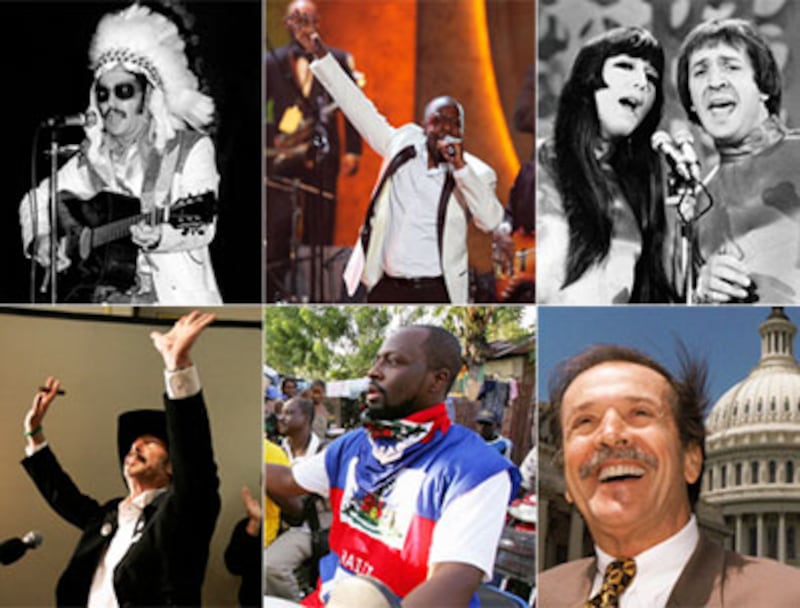In the days since Wyclef Jean announced that he is running for president of Haiti, new graffiti has been going up on city walls in Port-au-Prince: Jen Kore Jen, a smart if unintentional play on the musician's name that translates as: "Youth support youth."
The former member of the Fugees may have the support of spray-painting youth. But should he win the election scheduled for this November, he faces enormous challenges—not least among them, what to do about the largely unregulated international aid organizations that operate in the country.
Click Below to View 8 Politician Pop Stars

According to Karl Jean-Louis, an international development expert, Haiti has received more than $5 billion in international assistance in the last seven months alone. But there is little oversight on how the money is distributed, and there have been allegations of corruption.
• Michaelangelo Matos: When Pop Stars Become Politicians"You see NGO Toyotas coming around here all the time and I'm sure that a lot of 'em are trying to do good things," said Richard Morse, an American in Haiti. "But," added Morse, who owns the Hotel Oloffson, made famous by Graham Greene, "I can't say there is a vision behind it. I can't say that they are all collectively working in a unified way to achieve something. I think each one is doing its own thing."
Estimates of the number of international NGOs in Haiti range wildly from 600 to more than 10,000, depending on who is counting, and how. No authority tracks foreign-based NGOs, which can range from global nonprofits, such as World Vision or the Red Cross, to small missionary groups from Tennessee.
Haitians are grateful for the post-earthquake assistance but it's a gratitude tainted by resentment.
By law, all NGOs must register with the ministry of planning but most don't. Considering that most ministries lost staff and buildings during the earthquake, it is doubtful that the government even has the capacity to monitor international organizations. And many Haitians—and aid workers themselves—say that aid is often insufficient, poorly planned, and therefore sometimes wasted.
"A responsible government has to take ownership," said Karl Jean-Louis, who founded the non-profit Haiti Aid Watchdog after the earthquake shattered Haiti in January, killing more than 200,000 people.
Haitians are grateful for the post-earthquake assistance but it's a gratitude tainted by resentment. And resentment has only deepened since reports in the spring that many international charities have yet to do something with the money donated for Haiti disaster relief. Emergency supplies are still needed. Hurricane season is here and the vast majority of earthquake survivors, faced with 150 mph winds, still live in what might as well be paper tents.
Tapis Rouge is a blue-tarp and rusted-iron township of earthquake refugees that sprang up just north of a middle-class Port-au-Prince suburb. From a distance it resembles a deck of cards, mid-shuffle. Most of the people who live there walk up and down the hill several times a day in search of water and food. Sharing nothing is easy, but sharing little requires hard choices: Who eats today and how much? Who gets not one but two cups of water in 98-degree heat? Who bathes?
Between 10,000 and 13,000 people live in Tapis Rouge, sharing only six toilets in a wood-frame outhouse built by Doctors Without Borders. Bathing stalls, where men and women bathe side-by-side, are separated by only thin strips of plastic tarp, femmes and hommes stenciled on the front of each stall. The bathing set-up has brought problems of molestation, with boys and men often congregating to ogle women at the stalls, camp leaders said. One doctor said that his clinic, which treats people in the camp, sees four rape cases every week. Last week, three were teen girls; the youngest was 12.
As in other camps, an alphabet soup of international aid organizations throw desperately needed lifelines, but sometimes they tangle. Wyclef Jean himself has gotten involved with work on the ground, announcing last month the creation of Yéle Corps, a street-cleaning program intended to provide jobs to almost 1,000 people. (In 2005, the musician founded Yéle Haiti Foundation, an organization that has provided scholarships to thousands of children.)
There are thousands such smaller projects, but the lack of coordination among NGOs is evident in the camps and the poor areas of Haiti. In one rooftop settlement with a millionaire's harbor view, women complain that aid organizations deliver condoms at the end of each month, like clockwork, but that no organization regularly brings food or water to the approximately hundreds of families who live there.
And some of the areas most in need don't get any help at all, such as the Carrefour Feuilles neighborhood, considered a security "red zone"—a place where only a few aid organizations dare to operate.
It is not unusual to see children beg for food in stalled traffic, hitting up American aid workers who have brought toys, crayons, or coloring books—but no water.
But there is more than the glass between the aid workers and the people they are supposed to help.
In affluent Pétionville, aid workers pay New York City prices at the city's best restaurants, eating their dinners while children from nearby tent cities beg in the street. On weekends up the coast in Montrouis, the United Nations choppers its employees to Club Indigo, a posh private beach with extravagant lunch buffets and lounge chairs for the weary.
But Haitians don't want the aid organizations to leave; they just want more control and direction over the many organizations that have set up camp in the wake of the earthquake.
"Montesquieu and Rousseau said there is no society that can lead himself without a sheriff," said Jean Eddy Etienne, a slight 26-year-old law student. "Every society needs authority to make direction."
Whoever wins the presidency will have to be that sheriff.
Carla Murphy is a freelance writer who will graduate from the CUNY Graduate School of Journalism this fall. She has spent the last many weeks working in Haiti. She has blogged about her time working in Haiti on her site, Develop Haiti.





